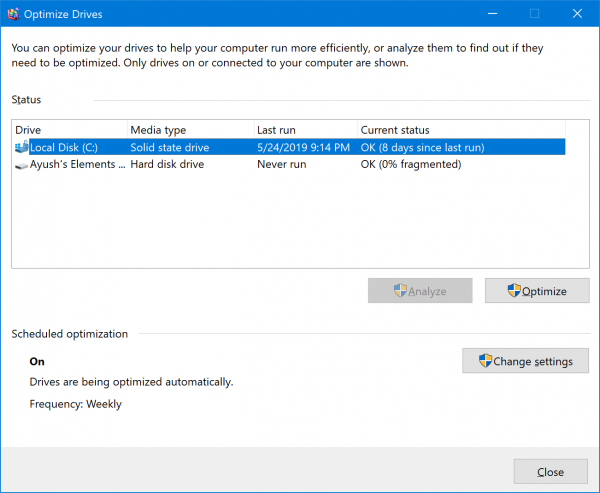

If I open up Task Scheduler, and select Microsoft\Windows\Defrag, I see the system-created task "ScheduledDefrag".

So, is this running automatically like it should, or not? Also, what time can I expect it to run? How do I tell if this is running correctly? Looking in Event Viewer and filtering the Application log for Event ID's 258 & 259, I see several entries for Event ID 258, with the source of Defrag, but they are all time-stamped for yesterdays manual optimization. This was a manual optimization done just prior to turning on the automatic option. The last run time for the drives shows as 6/14/21 at 10:14AM. In the drive Properties, under Optimize Drives I have enabled the automatic option running daily. If you disable defragmentation completely, you are taking a risk that your filesystem metadata could reach maximum fragmentation and get you potentially in trouble.Windows Server 2012 R2 with 3 drives. The intent is to maximize performance and a long life. Yes, your SSD's file system sometimes needs a kind of defragmentation and that's handled by Windows, monthly by default, when appropriate. Modern SSDs don't work the same way that we are used to with traditional hard drives. No, Windows is not foolishly or blindly running a defrag on your SSD every night, and no, Windows defrag isn't shortening the life of your SSD unnecessarily. Turns out that how microsoft handles SSDs in defrag can actually be beneficial. So u/oftheterra provided an excellent article link on the subject. But many folks have no idea that their SSDs are being defragged, if this is indeed the case and you'd think microsoft would prevent that. Now it's not a problem for me personally, because I know how to turn that sort of thing off. Defragging an SSD is not good, so I was curious before I got one, if Win10 automatically sets them to defrag like it does with standard HDDs?īecause you can go into your start menu and type defrag to check and see which drives get defragged, and even set them.


 0 kommentar(er)
0 kommentar(er)
